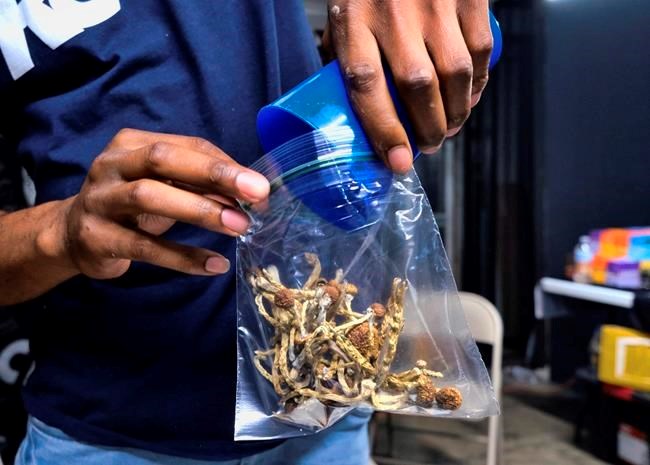Canada violated the rights of hundreds of patients awaiting access to psilocybin-assisted psychotherapy when it rejected applications from health-care professionals to consume the restricted drug for training purposes, a lawyer for the workers argued in Federal Court on Tuesday.
But Health Canada argued it hasn’t seen evidence that therapists ingesting the psychedelic trains them to provide more effective treatment.
The health workers' lawyer, Nicholas Pope, said there aren't enough health-care professionals licensed to provide psilocybin-assisted psychotherapy and Health Canada's decision means patients may have difficulty accessing therapists offering the treatment.
Pope and Health Canada made their argumentsas part of a request for a judicial review of Health Canada's June 2022 decision that denied applications from 96 health-care professionals to possess and consume psilocybin – the psychedelic compound produced by magic mushrooms – as part of training to obtain a licence to prescribe the drug.
The health workers – including doctors, psychologists, clinical counsellors, social workers and nurses – had requested an exemption under the Controlled Drugs and Substances Act.
Pope said the workers want the court to order Health Canada to retract its rejection of their applications to use the drug.
"Thousands of patients across Canada who suffer from treatment resistant depression, major depressive disorder, and end-of-life distress have tried countless treatments and medications but have found no relief," he told the court.
"Each day that goes on, the delay increases risk of harm ... Six of the waitlisted patients have testified that they've contemplated or attempted suicide."
Psilocybin-assisted psychotherapy involves ingesting consciousness-altering substances like psilocybin in a clinical setting as part of more traditional psychotherapy. A trained, licensed clinical practioner then provides therapy that guides patients as they experience the effects of psilocybin.
Pope cited in his arguments several peer-reviewed studies that found such psychotherapy can safely and effectively treat patients dealing with psychological and physical pain that is otherwise treatment resistant.
In 2020, Health Canada started granting exemptions under the Controlled Drugs and Substances Act to patients suffering from end-of-life psychological distress, treatment-resistant depression and major depressive disorder.
In December 2020 and January 2021, Health Canada granted exemptions to 19 health-care practitioners to consume and possess psilocybin as part of a psilocybin-assisted psychotherapy training program offered by TheraPsil, a non-profit organization that offers training to health-care practitioners and is working with patients to obtain psilocybin.
"Health-care practitioners have reported that the training improved their ability to treat patients, and no negative effects have resulted from this training or the exemptions," documents submitted to court by the health workers said.
Pope told Tuesday's hearing that about 80 Canadians have ingested psychedelics to treat their pain, with the government's permission, since 2020.
Hundreds more inquire about it daily to alleviate their anxiety, depression, suicidal ideations, opioid use disorder, post-traumatic stress disorder or other illnesses, he said.
"But there aren't enough professionals in the country to provide the treatment," Pope said.
"Two Manitoba health-care practitioners requested exemptions. If these two exemptions were approved, patients who otherwise have no qualified health-care practitioners within thousands of kilometres could gain access to psilocybin-assisted psychotherapy.''
The health workers are arguing the backlog of patients needing the service is so huge, Canadian doctors who are currently trained in the therapy don't have the capacity to meet the demand.
Pope also said there are reports of people who are untrained but are offering psilocybin therapy "and people are suffering harm."
Pope noted that Health Canada had urged health-care professionals to participate in an existing clinical trial or create their own but that doesn't work for several reasons.
One is that existing trials are costly, and are impractical in terms of timing and location, Pope said. Some professionals also don't want to participate in existing trials because the trials' purpose is to research psilocybin, a potential ethical problem for professionals whose focus is training.
Jennifer Francis, a lawyer for Health Canada, said the health professionals have not proven that therapists ingesting the drugs during training leads to better treatment.
There are Canadians who provide the psychotherapy without having consumed magic mushrooms during their trainings, Francis said.
She also said the minister believes the health-care professionals are making "sweeping and conclusive statements about the state of the scientific evidence" on psychedelics.
"In worst-case scenarios, people have jumped from buildings after having taken psilocybin," she said. "Lesser effects of what's known as a bad trip (are) characterized by anxiety, fear, panic, unhappiness and paranoia."
In response to the minister's concerns, Pope said it's important to note that the therapy requires a clinical expert to monitor a patient at all times so safety concerns with psychedelics are significantly reduced.
Yassie Pirani, a Vancouver-based registered clinical counsellor who is part of the case, said in a phone interview it is "absolutely essential" for experts who support patients during their psychotherapy to experience the psychedelics themselves.
"It's believed that by experiencing this non-ordinary state of consciousness first-hand, therapists ... are going to be better able to intervene and, more importantly, know when not to intervene," she said.
There are medications doctors currently prescribe, for example, that can lead to irreversible sexual dysfunction, but "psilocybin has a lot less risk and this is known in the research," said Pirani, who helps treat anxiety and depression.
Pope said in a phone interview he is expecting a decision within six months.
This report by The Canadian Press was first published March 28, 2023.
Fakiha Baig, The Canadian Press


